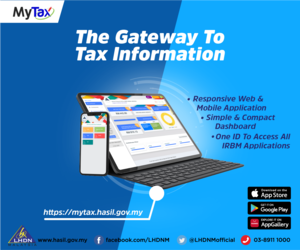IN any discussion of tax matters, one should be aware that the matter of tax collection is not simply an act of the ruling elite passing a law to plan expenses to run a government, funded by increasing taxes from individuals and organised economic units, said Sunway University Business School economics and finance department head Prof Mohamed Ariff Syed Mohamed.
It is a far more complex affair, he said, noting that the taxpayers also have inalienable rights in law to ensure fairness in the collection of taxation.
This is where capital statement analysis, a method used by tax authorities to analyse a taxpayer’s reported tax amount to find evidence of under-reporting, comes in. On receiving a tax return, tax authorities will first decide if there is a case of under-statement of tax amount, then process a capital statement analysis as authorised in writing by the director-general of the tax body – bearing in mind that under-stating is a punishable offence under tax laws.
That process will result in collecting evidence (or lack of evidence) for taking further action to recover a higher tax amount if there is indeed a provable understatement. The authorities may use personal persuasion to do so, but if that does not work, they would seek the court of law to decide on the case. A court of law will have to have valid evidence from the capital statement analysis to find a party guilty of a tax offence.
“The capital statement analysis is a way to gather that evidence since it has been used by tax authorities as a technique to detect and resolve tax fraud, even though there is no law that authorises a tax authority to adopt that process, ” he explained.
In societies where taxpayers are more aware of their rights, the use of a formal method is prescribed by laws after due preparation of a white paper, followed by public debate of a bill that will be read and passed as a law through a parliament to ensure fairness in the process.
For instance, Australia has adopted the Asset Betterment due process for the identification of under-statement of tax amount due. There are several highly publicised cases of Australia’s Australian Taxation Office (ATO) prosecuting both individuals and individual owners of firms employing this legally approved method, said Prof Mohamed Ariff.
He shared, “The tax practice commentators in Australia are reported to have stated that the Asset Betterment analysis is too blunt an instrument on taxpayers, although it is used in court cases. Individual taxpayer under-stating tax amounts can be quickly found out by the ATO accessing the bank accounts of the taxpayer, if the taxpayer is an individual.”
However, there is also another method of financial ratio analysis used by investigators to see if there are some recurrent patterns in one or more sets of financial ratios to identify evidence of tax understatement.
This method, he said, uses standard financial statements data to back-track the earnings of the firm computing a correct tax amount due.
In one such study relevant to Malaysia, it was found that six financial ratios are useful in identifying potential tax fraud filings. That general method, augmented using a big-data financial analytic tool, could identify under-statement of tax due at low cost, Prof Mohamed Ariff pointed out.
He also noted there is no law authorising any one particular method as a publicly agreed method that a tax authority should apply, with taxpayers satisfied that the process is transparent to gain public confidence.
“Those ratios use: sales; debt; before-tax profits; tax-to-profits; inventory; and account receivable. If a tax authority uses these ratio analysis as a crude tool to identify potential under-stating tax returns, that task may be easily done by a big-data analysis at very low cost.
“Studies in developed countries show that more than 50% of under-statements in tax filings are due to taxpayers massaging just the two ratios of sales and account receivable numbers, so the use of these just two financial ratios may help identify the majority of fraud cases, ” he said.
The Malaysian context
Total tax collection for the country in 2019 was RM145.11bil, but there has been no study on how much of this revenue has been lost by tax fraud over the years and how much it costs to recover the full amount due.
He opined, “That puts a damper on what one can say about the need for new laws, although law-making is a matter for politicians to decide on. But a few facts ought to be stated about taxation for a rational debate on this question if a particular method must have the power of ruling/laws.”
There are three groups of taxpayers in Malaysia, namely individuals, companies and foreignowned firms.
Individuals file tax returns to the Inland Revenue Board, which collects personal income tax at marginal rates of up to 28%, which amounts to 18% of total tax collection.
The second group are companies paying corporate income tax at a fixed rate of 24% of incomes, which in 2019 amounted to 48% of total tax collection. For firms with less than RM250,000 in capital and revenues below RM600,000 in a tax year, they enjoy a reduced tax rate of 17% of their earnings while foreign-owned firms pay a flat rate of 24%.
The last group are foreign-owned firms that previously enjoyed tax exemption, reverting to paying tax, which are paying at the normal 24% rate.
Though firms considered SMEs may only account for a smaller share of the gross domestic product (GDP), these firms enjoying lower tax rates are the backbone for creating jobs, introducing skills in production processes which help to increase productivity. Such firms are known to under-state tax due, he said, simply because such firms are very bad at record keeping. Individuals pay sales tax and firms pay excise duty.
The fact is, tax fraud can be perpetrated by any one of the three groups.
“Because under-statement of tax amount is far more serious in the cases of companies, given also their almost 1:1 ratio in dollar terms in total tax, also there are more cases of tax fraud by companies than individuals in the Malaysian context.
“It is to address the tax fraud of this group that has been at the forefront of the reason to use creative methods to detect under-statement of tax. That has also resulted in famous tax cases in all tax jurisdictions.
“Yes, individual tax returns could also be fraudulent and it is easier to detect such fraud by tracing cash flows in bank accounts in Australia using a law permitting the tax office to open bank accounts, ” he said.
When it comes to the need for law in solving tax fraud, Prof Mohamed Ariff said that it is a political and economic decision for the government in power.
The country’s tax history has been analysed and there is valid information in public libraries as well as government data. The economy in 2019 registered RM1.13tril GDP, which means the GDP share of tax burden is about 18 cents in a dollar. For a country with per capita income of some US$9,800 (RM39,704), this tax burden close to 20% is far higher than in many developing countries in the world.
Australia, a continent needing a lot more revenue, has a tax burden of 26% while the Organisation for Economic Co-operation and Development countries have an average of 26-30% with larger per capita.
In comparison, Malaysia, a much smaller developing nation, already has a much higher tax burden than the 120 developing countries, while the tax burden of developing nations is closer to 12%.
He noted, “Some commentators have suggested the tax burden has reached so high in the face of five to seven years of inflation and slow growth in wage-income, which is also evidenced by asset inflation in Malaysia, both pushing consumer affordability downwards over the last 10 years, resulting in the 2019 national campaigns for financial literacy to stem indebtedness.”
What does that mean for tax fraud cases? In the first place, Prof Mohamed Ariff said there is a need to closely study the tax-fraud cases urgently before discussing the laws that should be put in place.
“There is a need for data on the prevalence of tax fraud, in terms of how much revenues are forgone by tax fraud and the cost of recovery actions. Until such a study is done, the public would not be favourable to authorise a legal framework to get taxpayers to be more compliant.
“If indeed a significant tax revenue is being lost, then this item needs to be discussed in public, the debate based on solid evidence on the need for recourse to law to increase recovery of lost revenue through a legal tooth in law to make under-stating tax a serious offence.
“The long-run economic growth path is estimated in the range of 4.2% to 4.8% as a consensus forecast. One would say that at this growth rate (if action does rein in further ringgit devaluation), the tax revenue will keep increasing at about the same rate into the near future.
“Hence, reining in lost revenue is a potential measure that should increase tax amount, more so if laws are in place specifying a stricter stand on under-stating tax amounts in tax returns. That decision needs valid data and public debate for taxpayers to accept the fairness in tax collection, ” he said.






